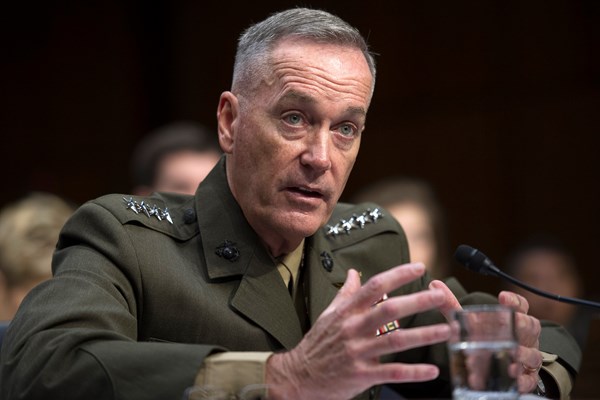American commander calls Russia, China and Iran the biggest challenges for the US
US General Joseph Dunford, Chairman of the Joint Chiefs of Staff (JCS), said that the biggest challenges for the US Armed Forces are Russia, China, Iran, North Korea, and also extremism. He made this statement in his introduction which was prepared for the hearings at the US House Committee on Armed Services.
“In today’s strategic environment five key challenges – Russia, China, Iran, North Korea, and violent extremist organizations – most clearly represent the challenges facing the Joint Force,” Dunford noted.
According to the general, Russia and China “have accelerated the development of modernization programs (of their armed forces) for asymmetric opposition of the American (military) advantage”. He claims that Moscow and Beijing’s efforts “were designed to limit the freedom of US ship movement”, creating an obstacle to Washington’s capabilities to “achieve and maintain superiority in the air” and to “make use of complicated control systems”.
Dunford believes that Russia is continuing to invest in a full range of capabilities designed to limit the US’s ability to meet its NATO commitments.
The general explained that by “capabilities” he is referring specifically to an increase in capabilities in space, cyberspace, on the ground and at sea. “Russia is also modernizing nearly all elements of its nuclear triad and its non-strategic nuclear weaponry,” the commander specified. He claims that “these capabilities allow Russia… to undermine the credibility of the NATO alliance”.
The chairman of the JCS emphasized that China “has embarked on a significant program to modernize and expand strategic and conventional military capabilities.” According to Dunford, China “is continuing to expand its presence in the South China Sea” and to “invest in (the development of) space, supersonic weaponry, cruise and ballistic missiles”, as well as to improve their capabilities in cyberspace. China’s development of 5th generation fighters, air-to-air missiles, and air defense systems limits the US’s ability to meet its commitments to its allies in the Pacific.
Dunford observed that the development of the nuclear and missile program of North Korea threatens the safety of the US and its allies in the Pacific.
“North Korea’s development of nuclear weaponry, combined with continued efforts to build a viable nuclear-capable ballistic missile threaten the security of the homeland and our allies in the Pacific Ocean. Over the past year, North Korea conducted an unprecedented number of missile tests,” he said.
According to the general, Pyongyang “has demonstrated a willingness to use malicious cyber tools against governments and industry”. “These actions destabilize the region and pose an increasing threat to US forces and our allies,” Dunford specified.
Dunford also called Russia the enemy of the US while responding to lawmakers’ questions at the hearings of the House Committee on Armed Forces.
“I think that we have adversarial relations with Russia. Yes, congressmen”, Dunford said, responding to a question whether he considers Russia to be the enemy of the US.
US Secretary of Defense James Mattis expressed a similar perspective.
“(Russian President Vladimir) Putin made a decision to be a strategic competitor (of the US). Yes,” Mattis responded to a similar question.
He said that he does not “see any indication” that Moscow “would want a positive relationship” with Washington. He emphasized that there “cannot be military collaboration” between the two countries.
